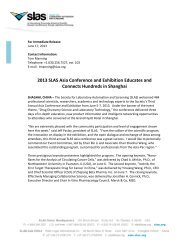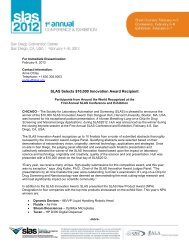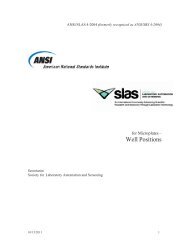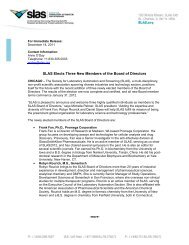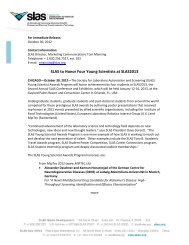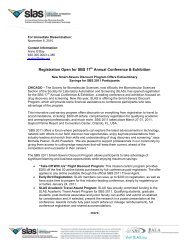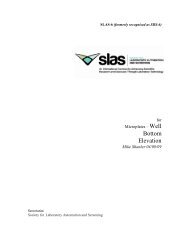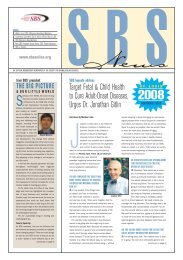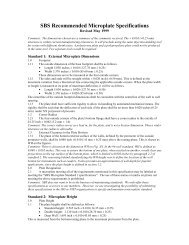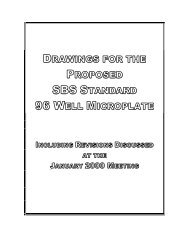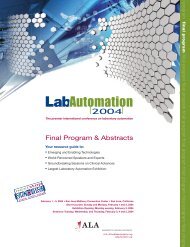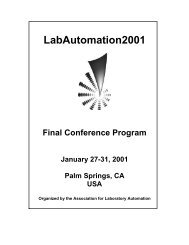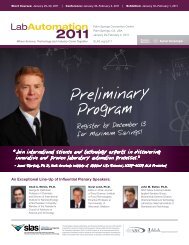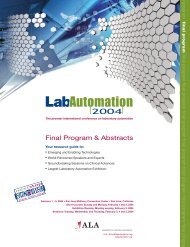- Page 1:
JANUARY 21-25, 2006 PALM SPRINGS CO
- Page 5:
Media Partners: european pharmaceut
- Page 8 and 9:
Conference Chairs and Scientific Co
- Page 10 and 11:
ALA Board of Directors Peter Grands
- Page 12 and 13:
LabAutomation2006 Get Involved Thro
- Page 14 and 15:
LabAutomation2006 Back by Popular D
- Page 16 and 17:
LabAutomation2006 Recognizing Scien
- Page 18 and 19:
Registration Location: Lobby, Palm
- Page 20 and 21:
Security To contact the Palm Spring
- Page 22 and 23:
Notes LabAutomation2006 20
- Page 24 and 25:
LabAutomation2006 Conference Floor
- Page 26 and 27:
Program Overview Saturday, January
- Page 28 and 29:
11:30 am Page 91 12:00 pm Page 92 1
- Page 30 and 31:
10:30 am Page 64 11:00 am Page 65 1
- Page 32 and 33:
LabAutomation2006 4:30 pm Page 98 C
- Page 34 and 35:
Notes LabAutomation2006 32
- Page 36 and 37:
LabAutomation2006 MP01 A Streamline
- Page 38 and 39:
LabAutomation2006 MP35 Automated Di
- Page 40 and 41:
LabAutomation2006 MP68 Automation o
- Page 42 and 43:
LabAutomation2006 TP01 LeadStream -
- Page 44 and 45:
LabAutomation2006 TP35 Identificati
- Page 46 and 47:
LabAutomation2006 TP70 Effective Mi
- Page 48 and 49:
Notes LabAutomation2006 46
- Page 50 and 51:
LabAutomation2006 8:15 am Monday, J
- Page 52 and 53:
LabAutomation2006 1:30 pm Wednesday
- Page 54 and 55:
LabAutomation2006 12:00 pm Monday,
- Page 56 and 57:
LabAutomation2006 4:30 pm Monday, J
- Page 58 and 59:
LabAutomation2006 12:00 pm Tuesday,
- Page 60 and 61:
LabAutomation2006 4:30 pm Tuesday,
- Page 62 and 63:
LabAutomation2006 10:30 am Wednesda
- Page 64 and 65:
LabAutomation2006 12:00 pm Monday,
- Page 66 and 67:
LabAutomation2006 4:30 pm Monday, J
- Page 68 and 69:
LabAutomation2006 12:00 pm Tuesday,
- Page 70 and 71:
LabAutomation2006 4:30 pm Tuesday,
- Page 72 and 73:
LabAutomation2006 10:30 am Wednesda
- Page 74 and 75:
LabAutomation2006 12:00 pm Monday,
- Page 76 and 77:
LabAutomation2006 4:30 pm Monday, J
- Page 78 and 79:
LabAutomation2006 12:00 pm Tuesday,
- Page 80 and 81:
LabAutomation2006 4:30 pm Tuesday,
- Page 82 and 83:
LabAutomation2006 10:30 am Wednesda
- Page 84 and 85:
LabAutomation2006 12:00 pm Monday,
- Page 86 and 87:
LabAutomation2006 4:30 pm Monday, J
- Page 88 and 89:
LabAutomation2006 12:00 pm Tuesday,
- Page 90 and 91:
LabAutomation2006 4:30 pm Tuesday,
- Page 92 and 93:
LabAutomation2006 10:30 am Wednesda
- Page 94 and 95:
LabAutomation2006 12:00 pm Monday,
- Page 96 and 97:
LabAutomation2006 4:30 pm Monday, J
- Page 98 and 99:
LabAutomation2006 12:00 pm Tuesday,
- Page 100 and 101:
LabAutomation2006 4:30 pm Tuesday,
- Page 102 and 103:
LabAutomation2006 10:30 am Wednesda
- Page 104 and 105: Notes LabAutomation2006 102
- Page 106 and 107: MP03 Ismail Al-Abdulmohsen Saudi Ar
- Page 108 and 109: MP07 Varouj Amirkhanian eGene, Inc.
- Page 110 and 111: MP11 Sibani Biswal University of Be
- Page 112 and 113: MP15 Josh Eckman University of Utah
- Page 114 and 115: MP19 Ismet Celebi National Institut
- Page 116 and 117: MP23 Robin Clark deCODE Biostructur
- Page 118 and 119: MP27 J. Colin Cox Duke University M
- Page 120 and 121: MP31 Frank Doffing IMM - Institut f
- Page 122 and 123: MP35 Aoife Gallagher Deerac Fluidic
- Page 124 and 125: MP39 Yunseok Heo University of Mich
- Page 126 and 127: MP43 David Humphries Lawrence Berke
- Page 128 and 129: MP47 Joohoon Kim University of Texa
- Page 130 and 131: MP51 Michelle Li Saint Louis Univer
- Page 132 and 133: MP55 Philip Manning Procter & Gambl
- Page 134 and 135: MP59 Irena Nikcevic University of C
- Page 136 and 137: MP63 Qiaosheng Pu Virginia Commonwe
- Page 138 and 139: MP67 Alexander Roth National Instit
- Page 140 and 141: MP71 Sang Jun Son University of Mar
- Page 142 and 143: MP75 Lois Tack PerkinElmer Life & A
- Page 144 and 145: MP79 Angelo Trivelli J Craig Venter
- Page 146 and 147: MP83 Tracy Worzella Promega Corpora
- Page 148 and 149: MP87 Peter Greenhalgh Astech Projec
- Page 150 and 151: MP91 David Ferrick Seahorse Bioscie
- Page 152 and 153: MP95 Christine Brideau Merck Frosst
- Page 156 and 157: TP05 Marcy Engelstein Millipore Cor
- Page 158 and 159: TP09 Aoife Gallagher Deerac Fluidic
- Page 160 and 161: TP13 Ulrike Honisch Greiner Bio-One
- Page 162 and 163: TP17 Michael Gary Jackson Beckman-C
- Page 164 and 165: TP21 Libby Kellard Millipore Danver
- Page 166 and 167: TP25 Joseph Kofman Pfizer San Diego
- Page 168 and 169: TP29 Hanh Le PerkinElmer Life and A
- Page 170 and 171: TP33 Stephen Lowry Thermo Electron
- Page 172 and 173: TP37 Donald J. Nagy California Comp
- Page 174 and 175: TP41 Clifford Olson Zinsser Analyti
- Page 176 and 177: TP45 Nick Price Invitrogen Corporat
- Page 178 and 179: TP49 Michael Raimo Arqule Inc. Wobu
- Page 180 and 181: TP53 Jim Schools Biosero, Inc Monro
- Page 182 and 183: TP57 Darcy Shave Waters Corporation
- Page 184 and 185: TP61 Robert Stanaker Perkin Elmer D
- Page 186 and 187: TP65 Henrik Svennberg Astrazeneca R
- Page 188 and 189: TP69 Paige Vinson Thermo Electron C
- Page 190 and 191: TP73 Thomas Weierstall Qiagen Gmbh
- Page 192 and 193: TP77 Susan Yan Pierce Biotechnology
- Page 194 and 195: TP81 Wayne Bowen TTP LabTech Melbou
- Page 196 and 197: TP85 Evan F. Cromwell Blueshift Bio
- Page 198 and 199: TP89 Wanli Xing Tsinghua University
- Page 200 and 201: TP93 Holger Gumm Sepiatec GmbH Berl
- Page 202 and 203: Notes LabAutomation2006 200
- Page 204 and 205:
LabAutomation2006 Monday, January 2
- Page 206 and 207:
LabAutomation2006 Monday, January 2
- Page 208 and 209:
LabAutomation2006 Tuesday, January
- Page 210 and 211:
LabAutomation2006 Tuesday, January
- Page 212 and 213:
Notes LabAutomation2006 210
- Page 214 and 215:
LabAutomation2006 New Product Launc
- Page 216 and 217:
LabAutomation2006 New Product Launc
- Page 218 and 219:
LabAutomation2006 Exhibitor List (a
- Page 220 and 221:
LabAutomation2006 Exhibit Hall Janu
- Page 222 and 223:
Allmotion Inc. 5501 Del Oro Ct. San
- Page 225 and 226:
ASDI 601 Interchange Boulevard Newa
- Page 227 and 228:
Barnstead Genevac 707 Executive Bou
- Page 229:
BioMicrolab 2500 Dean Lesher Drive
- Page 232:
Caliper Life Sciences, Inc. 68 Elm
- Page 236:
deCODE biostructures 7869 NE Day Ro
- Page 240:
Elsevier MDL 14600 Catalina Street
- Page 243:
Genedata, Inc. 1601 Trapelo Road, S
- Page 247 and 248:
IDBS 750 US Highway 202, Suite 200
- Page 249 and 250:
Ivek Corporation 10 Fairbanks Road
- Page 251 and 252:
LCGC 485 Route 1 South, Building F,
- Page 254:
MeCour Temperature Control, LLC 10
- Page 258 and 259:
nAscent BioSciences Inc. 101 Rogers
- Page 260 and 261:
NSK Precision America, Inc. 3450 Be
- Page 263:
Parker Hannifin Corporation 6035 Pa
- Page 266 and 267:
ProGroup Instrument Corporation 494
- Page 269:
Robots and Design Co., Ltd. E-801 B
- Page 272 and 273:
Seahorse Bioscience, Inc. 16 Esquir
- Page 274:
SMC Corporation 3011 North Franklin
- Page 277 and 278:
Tecan P.O. Box 13953 Research Trian
- Page 279 and 280:
Tomtec, Inc. 1000 Sherman Avenue Ha
- Page 281 and 282:
Waters Waters Corporation 34 Maple
- Page 283 and 284:
Notes Where Laboratory Technologies
- Page 285 and 286:
Where Laboratory Technologies Emerg
- Page 287 and 288:
Where Laboratory Technologies Emerg
- Page 289 and 290:
Where Laboratory Technologies Emerg
- Page 291 and 292:
Where Laboratory Technologies Emerg
- Page 293 and 294:
Notes Where Laboratory Technologies
- Page 295 and 296:
Index 4titude .....................
- Page 297 and 298:
Comita, Paul B. ...................
- Page 299 and 300:
Harten, Bill ......................
- Page 301 and 302:
M Ma, Kuo-Sheng ...................
- Page 303 and 304:
Reptron Outsource Manufacturing & D
- Page 305 and 306:
V V&P Scientific ..................



